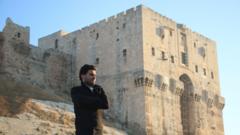In the heart of Aleppo, the recent rebel takeover has stirred deep emotions among its residents, notably showcased by the reunion of Abdulkafi, an English teacher, with his elderly father after years of separation. The emotional embrace was captured in a video, highlighting moments of joy against a backdrop of tension and uncertainty following the control shift from government forces to the armed group Hayat Tahrir al-Sham (HTS).
While many firsthand accounts from Aleppo reveal respectful interactions with HTS fighters and improvements in basic services such as electricity and water, underlying fears of renewed conflict persist. The United Nations reports tens of thousands displaced amidst the fighting, and many residents express concern over potential airstrikes as government forces continue to threaten the area.
One local described their current state, saying, “We’re living in complete apprehension,” and voiced worries about families venturing outside for daily needs. The scars of past bombings linger, leading to heightened anxiety among the population. Aleppo, which had seen a semblance of peace post-2016 after heavy government recapture, now treads a fraught path marked by insecurity and distrust.
Witness testimonies indicate a palpable atmosphere of fear, as families like Abdulkafi's navigate the complexities of living under a regime that could potentially reclaim the city. “Nineteen Eighty-Four is applied in Aleppo," Abdulkafi commented, drawing parallels with George Orwell's bleak portrayal of surveillance and control.
HTS, initially known as Jabhat al-Nusra and affiliated with al-Qaeda, claims a softened approach in their governance, yet skepticism abounds as residents recall historical mistreatment by such groups. A reporter's interaction on the streets revealed further uneasy dynamics, with militiamen questioning women about their dress while assuring safety.
Moreover, the Christian community in Aleppo has not reported significant issues since HTS took over, although the lingering memories of past persecutions fuel cautious optimism. As political analysts observe the situation, fears regarding potential escalations remain at the forefront of community consciousness, leading many to feel betrayed and uncertain about their future safety.
In these fragile times, families are hoping for safety and normalcy but grapple with the shadows of war that could return at any moment. The emotional juxtaposition of reunion, fear, and hope paints a complex picture of life in Aleppo following revolution, with many looking for reassurance amidst chaos.
While many firsthand accounts from Aleppo reveal respectful interactions with HTS fighters and improvements in basic services such as electricity and water, underlying fears of renewed conflict persist. The United Nations reports tens of thousands displaced amidst the fighting, and many residents express concern over potential airstrikes as government forces continue to threaten the area.
One local described their current state, saying, “We’re living in complete apprehension,” and voiced worries about families venturing outside for daily needs. The scars of past bombings linger, leading to heightened anxiety among the population. Aleppo, which had seen a semblance of peace post-2016 after heavy government recapture, now treads a fraught path marked by insecurity and distrust.
Witness testimonies indicate a palpable atmosphere of fear, as families like Abdulkafi's navigate the complexities of living under a regime that could potentially reclaim the city. “Nineteen Eighty-Four is applied in Aleppo," Abdulkafi commented, drawing parallels with George Orwell's bleak portrayal of surveillance and control.
HTS, initially known as Jabhat al-Nusra and affiliated with al-Qaeda, claims a softened approach in their governance, yet skepticism abounds as residents recall historical mistreatment by such groups. A reporter's interaction on the streets revealed further uneasy dynamics, with militiamen questioning women about their dress while assuring safety.
Moreover, the Christian community in Aleppo has not reported significant issues since HTS took over, although the lingering memories of past persecutions fuel cautious optimism. As political analysts observe the situation, fears regarding potential escalations remain at the forefront of community consciousness, leading many to feel betrayed and uncertain about their future safety.
In these fragile times, families are hoping for safety and normalcy but grapple with the shadows of war that could return at any moment. The emotional juxtaposition of reunion, fear, and hope paints a complex picture of life in Aleppo following revolution, with many looking for reassurance amidst chaos.
















